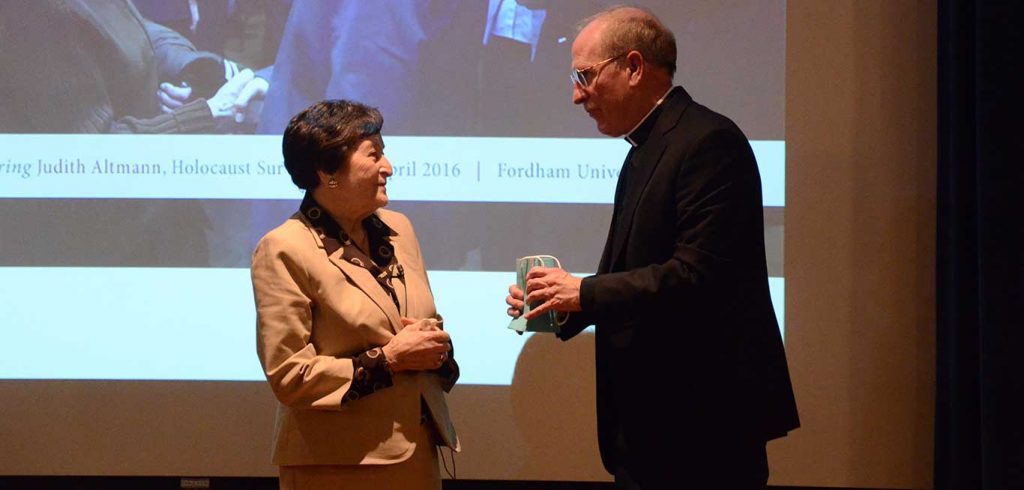Judy Altmann believed that she would survive the Holocaust at arguably the worst moment in her life, when she saw her father for the last time.
Her family had just arrived at the Auschwitz concentration camp after a horrendous four-day trip via cattle car. After walking past a sign that read “Work will liberate you,” she said the Nazi physician Josef Mengele separated those who’d stay from those who’d be killed immediately. Altman and her niece were told to move to the left, her father was told to keep moving.
“He put his hand on his head as he did every Friday night when he blessed us for the Shabbos meal and said ‘Judy, you will live,’” she said, her voice quavering.
“These are the words that kept me alive when I thought I could no longer endure.”
Altmann shared her incredible tale of survival “Zakhor…Remember” at the Rose Hill campus on April 4, in an event sponsored by the Jewish studies program.
A native of Jasina, Czechoslovakia, Altmann spent five years living under Nazi occupation before being arrested in 1944 and sent to the Auschwitz concentration camp, the Essen and Gelsenkirchen labour camps, and the Bergen Belsen concentration camp.
As horrific as Auschwitz was, it was only one chapter in Altmann’s saga filled with unimaginable suffering, as well as luck. In one anecdote, she spoke of hurting her arm at a labor camp—which would normally have necessitated a return to Auschwitz, and likely an execution. But in the middle of the night, she said, an SS officer tapped Altman, who knew several languages, on the shoulder.
“She took me to the hospital to put a cast on my arm. On the way back, she stopped off in the factory and she asked her supervisor to provide her with a letter. The letter said, ‘If [Altmann] is taken away, the work is not going to be done if someone needs to be spoken to in Czech, in Hungarian, in Russian, in Yiddish or whatever languages. He gave her the letter, and I was saved,” she said.
“You students are the most fortunate and live in the most wonderful country in the world. Learn all you can, because nobody can take this away from you.”
She said that Bergen Belsen, where she was confined until May 1945 when English soldiers liberated the camp, was so bad that anyone who survived it lived forever.
“Mountains and mountains of dead bodies everywhere. Hygiene? None whatsoever. You stepped over bodies wherever you went,” she said, noting that her niece came down with full-blown jaundice. To earn an extra bowl of soup, Altman volunteered to dispose of dead bodies.
Both she and her niece survived. Her niece returned to Czechoslovakia and Altmann lived in Sweden until 1948, when she immigrated to the United States. She has been speaking about the horrors of the Holocaust ever since.
“Don’t listen to what your friends say. Think for yourself, and see what you can do to make a better world. We cannot change the past; it’s gone. But you can create a better world,” she told student members of the audience.
“When you go home, hug your mother and father and your grandma and grandpa, and thank God that you have them and they have you.”
Joseph M. McShane, SJ, president of Fordham, applauded Altmann’s plea to never forget, and added “never again” to the conversation.
“We must learn to love one another, because that is why we are here,” he said, “and to resolve in our hearts that what happened then never happens again.”


